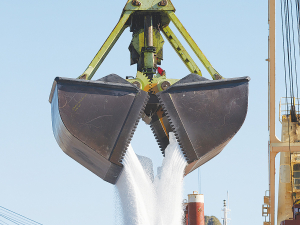Ravensdown partners with Footrot Flats to celebrate Kiwi farming heritage
Ravensdown has announced a collaboration with Kiwi icon, Footrot Flats in an effort to bring humour, heart, and connection to the forefront of the farming sector.
 The 2,700 tonnes of urea from Saudi Arabia is key to supporting Ravensdown's commitment to reduce carbon emissions by 50% by 2030.
The 2,700 tonnes of urea from Saudi Arabia is key to supporting Ravensdown's commitment to reduce carbon emissions by 50% by 2030.
Fertiliser co-operative Ravensdown recently received a delivery of low-carbon urea - a major step to lower its environmental footprint.
The 2,700 tonnes of urea from Saudi Arabia, SABIC Agri-Nutrients Company (SABIC AN), is key to supporting Ravensdown's commitment to reduce carbon emissions by 50% by 2030.
Ravensdown chief executive Garry Diak says the collaboration with SABIC AN is crucial. It's also the first ever global shipment of low-carbon urea for the Saudi Arabian company.
"As pressure mounts for New Zealand farmers to lower greenhouse gas emissions from behind the farm gate, we are working on their behalf right through the value chain to support them," says Diack.
"SABIC AN's innovative manufacturing techniques for urea production have the potential to be game changing for the global fertiliser industry. We are excited to continue our valued collaboration with a company that has environmental goals and aspirations that are very aligned to our own."
Leading independent testing, inspection, and certification agency TÜV Rheinland has confirmed that the urea manufacturing process produces 64% less carbon dioxide per tonne of urea than standard processing.
While it's manufactured using less carbon, the properties of the urea remain the same. This means emissions generated using the urea on pasture or crops does not change and the low carbon advantage is captured as a scope 3 (indirect) emission only.
"We continue to develop our 25-year relationship with SABIC AN, working together on future innovations to reduce the carbon footprint of the whole supply chain," says Diack.
SABIC AN says the innovative manufacturing solution for low carbon urea was recently recognised by the prestigious Edison Awards as a Gold Food and Agriculture Advancements "Soil & Crop" category.
Saudi Arabia is already a pioneer in the production and export of clean hydrogen and derivatives such as ammonia. It has partnered with New Zealand on this innovative venture as part of its ambitious strategy to be the world's leading clean hydrogen hub, the company says.
The kingdom is seeking to forge partnerships with entities from all over the world to help them meet their clean energy targets.
SABIC AN chief executive Abdulrahman Shamsaddin says sustainability is integrated into its strategy, enabling them to deliver responsible business and generate sustainable growth.
"We are constantly developing solutions empowering our customers to achieve their own sustainability ambitions.
"Our collaboration with Ravensdown is a major step in this direction and a strong indicator of SABIC's overall commitment to delivering low-carbon solutions to customers and helping them achieve their net-zero targets."
Mating wrapped up last month at the across-breed Beef Progeny Test on Pāmu’s Kepler Farm in Manapouri.
Libby Judson is a keeper of memories from an age gone by. Tim Fulton tells her story.
A New Zealand-first native tree study has highlighted the Bioeconomy Science Institute's position as a forestry research leader.
Hemp fibre processor Rubisco is relocating its core processing facility to Ashburton as part of a $20-$30 million expansion to leverage what it says is an accelerating global demand for sustainable and renewable fibres.
Tradition meets some of the latest in technology at the 2026 East Coast Farming Expo.
OPINION: Trade Minister Todd McClay and the trade negotiator in government have presented Kiwis with an amazing gift for 2026 - a long awaited and critical free trade deal with India.